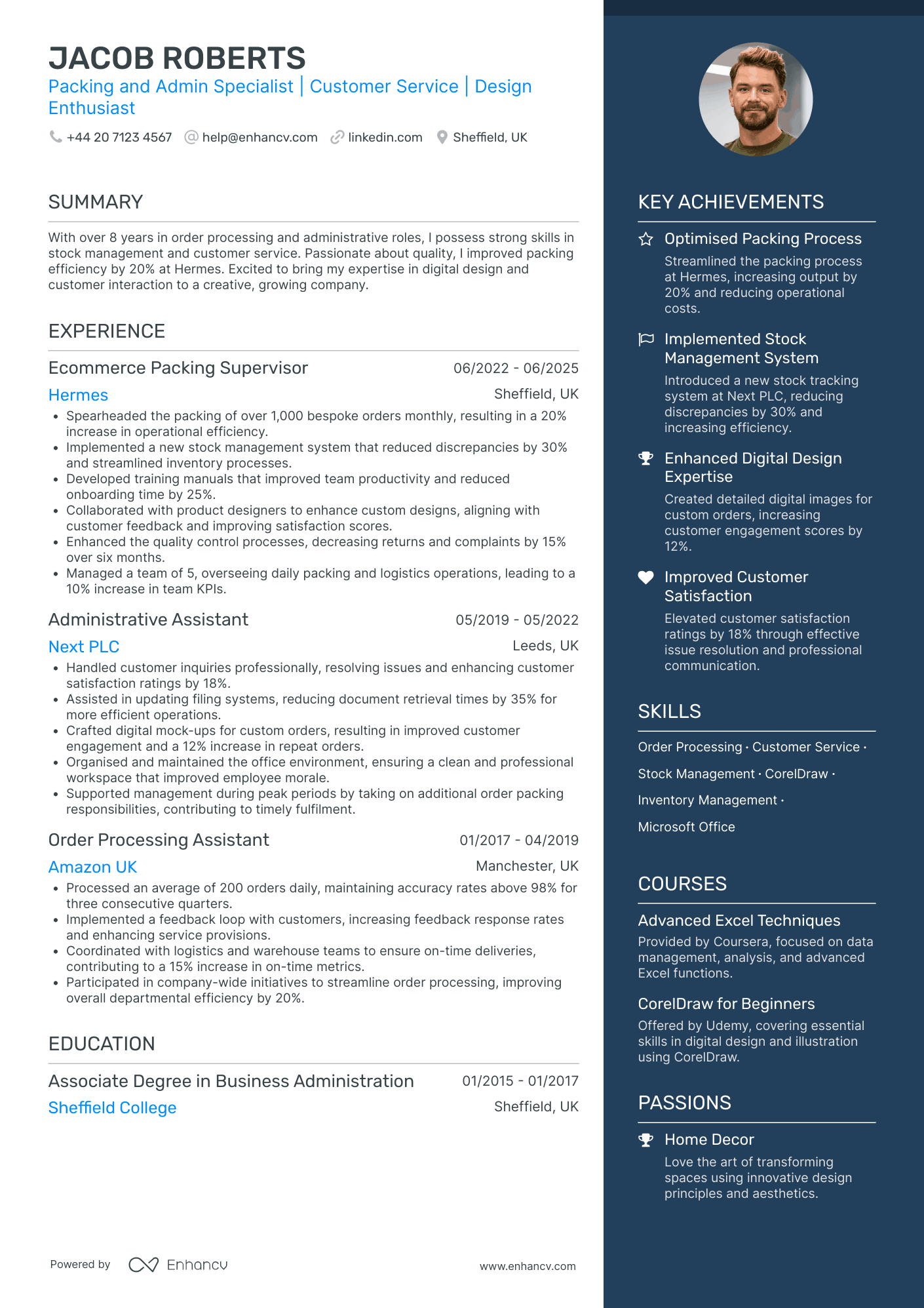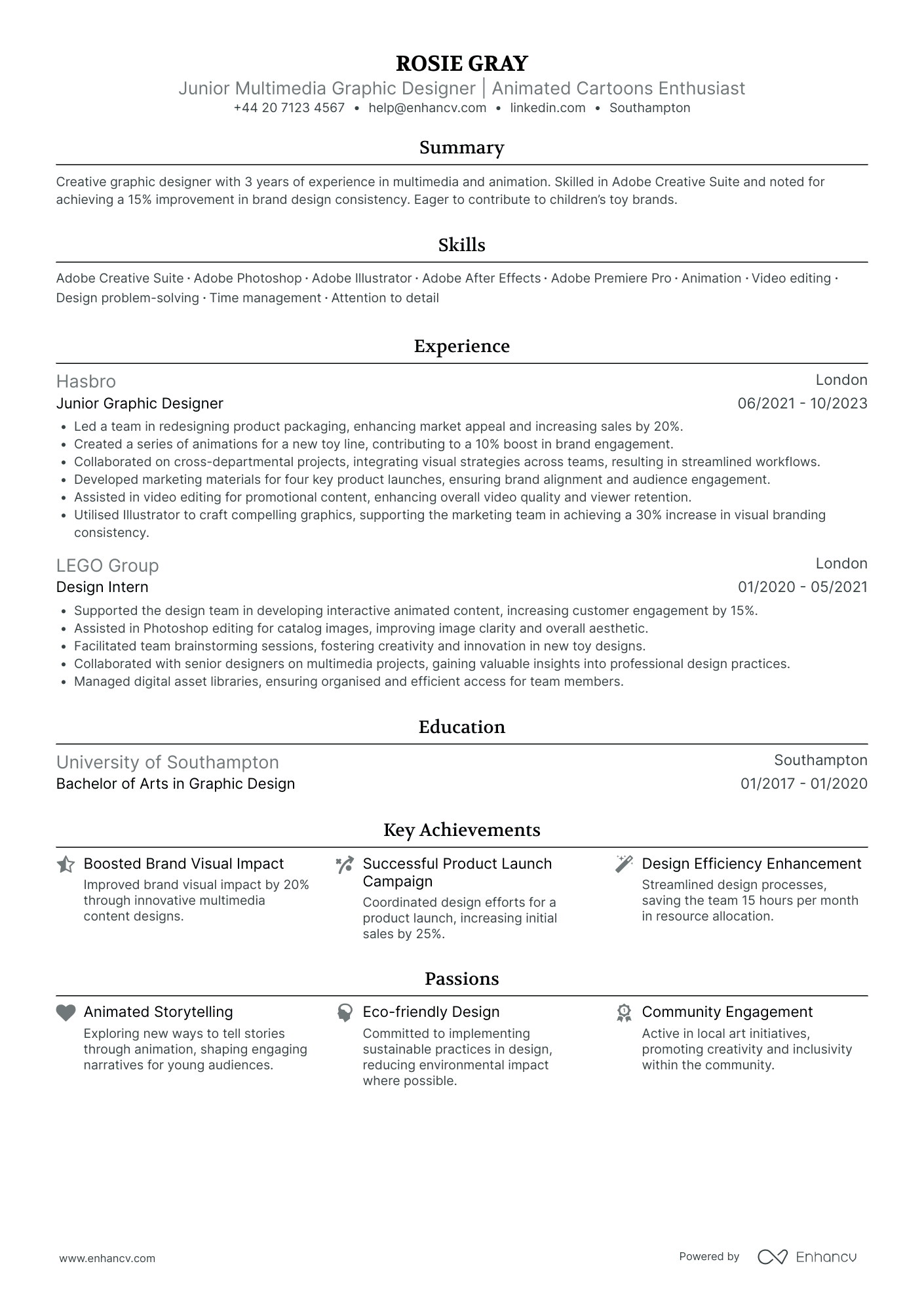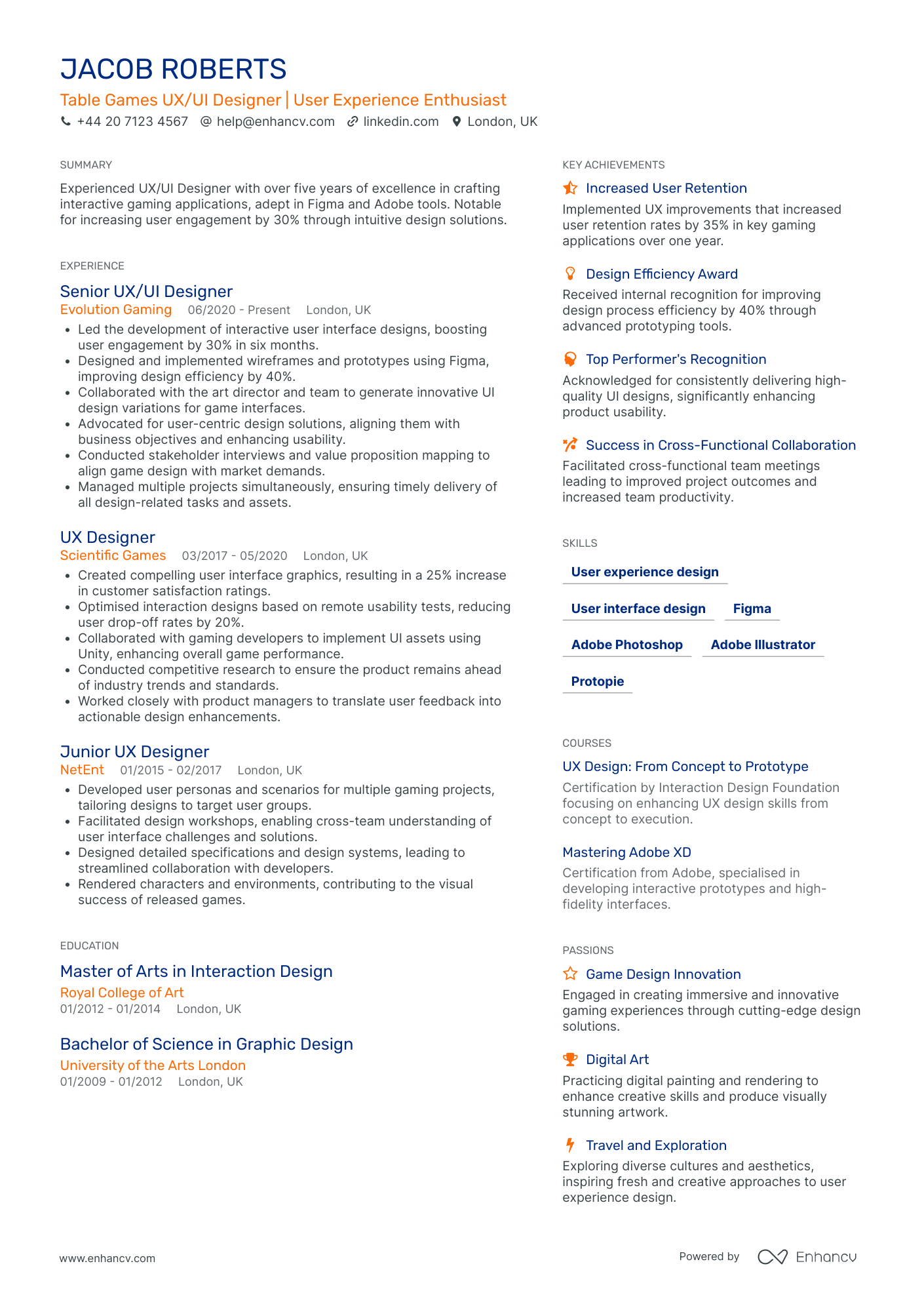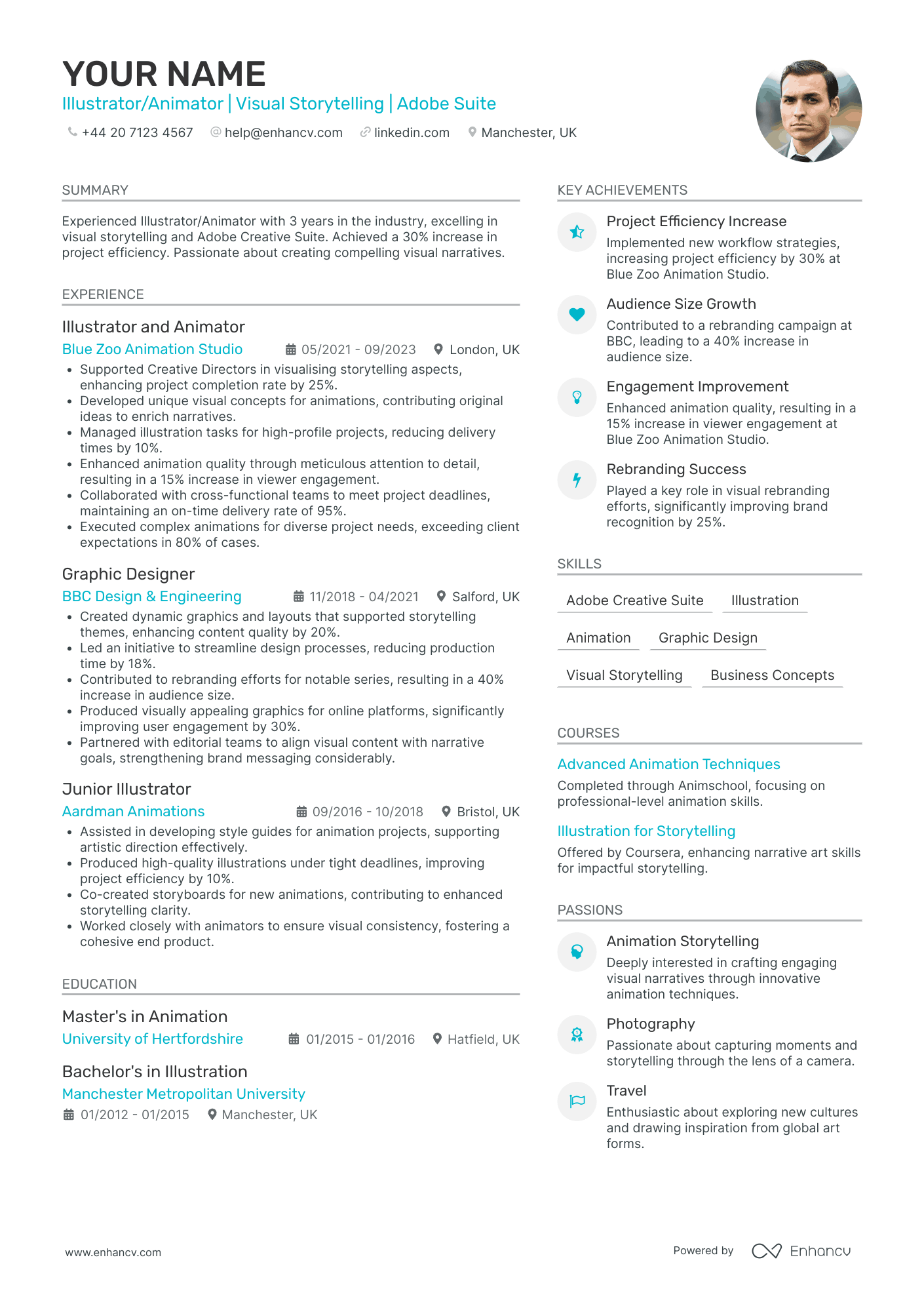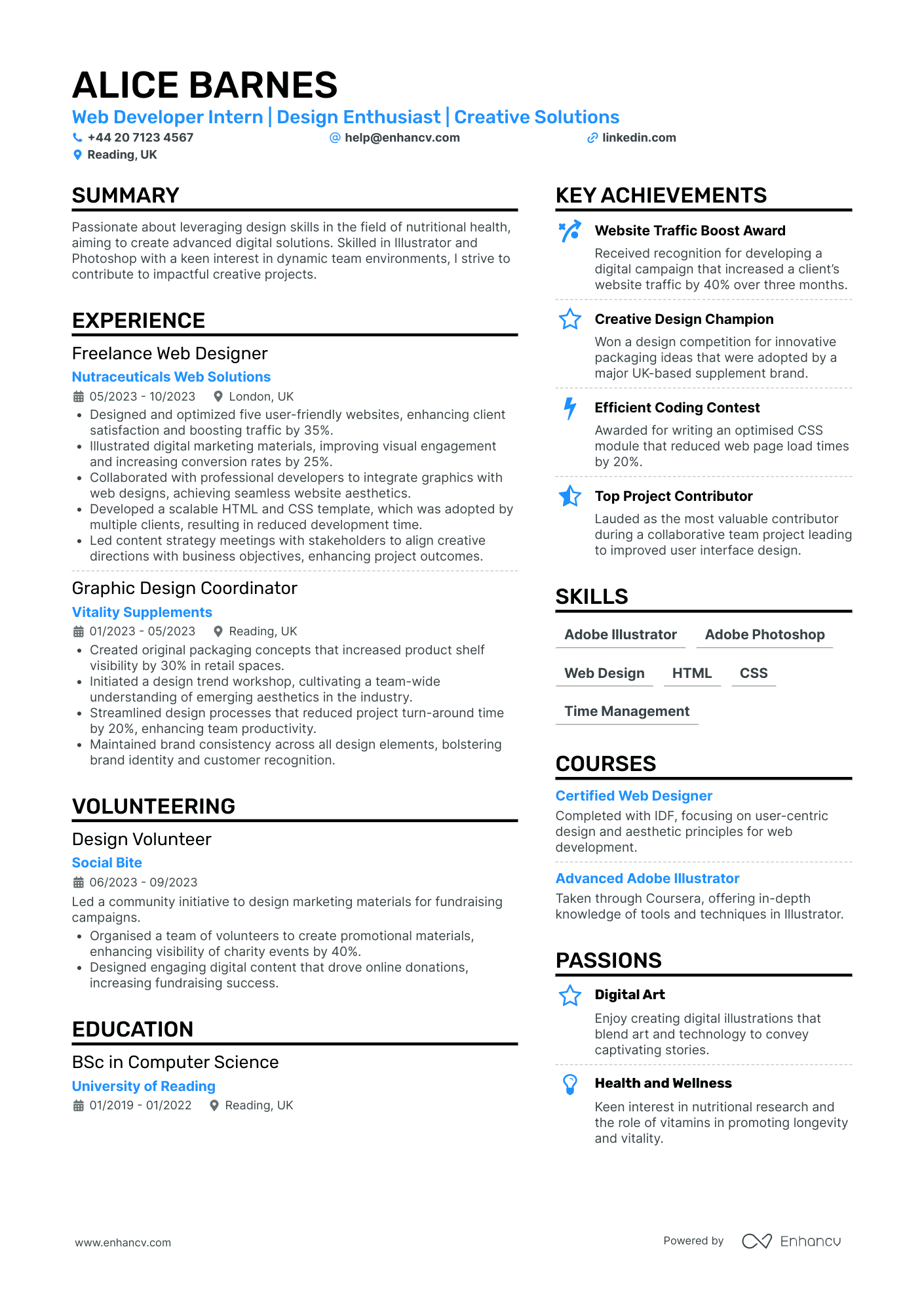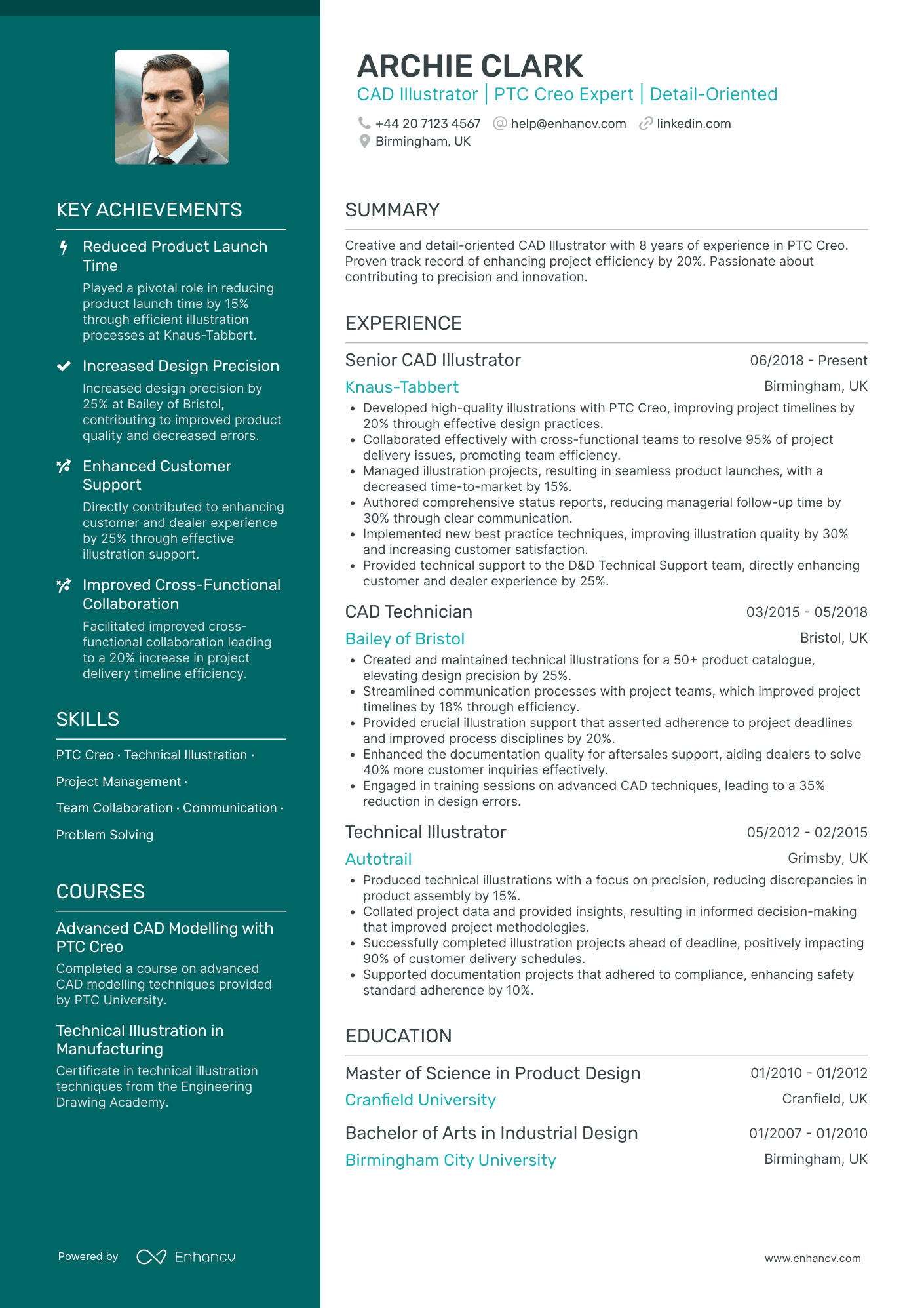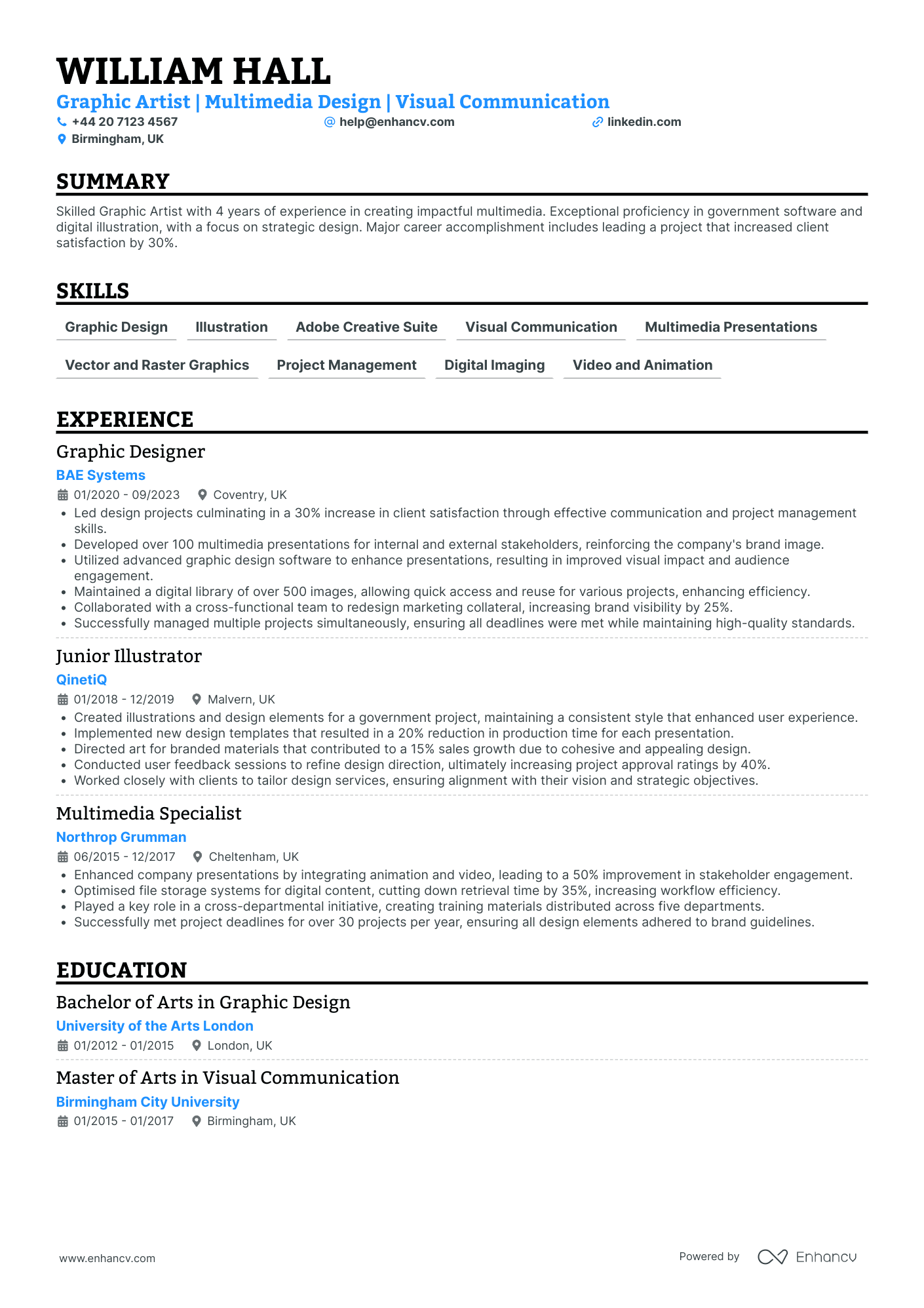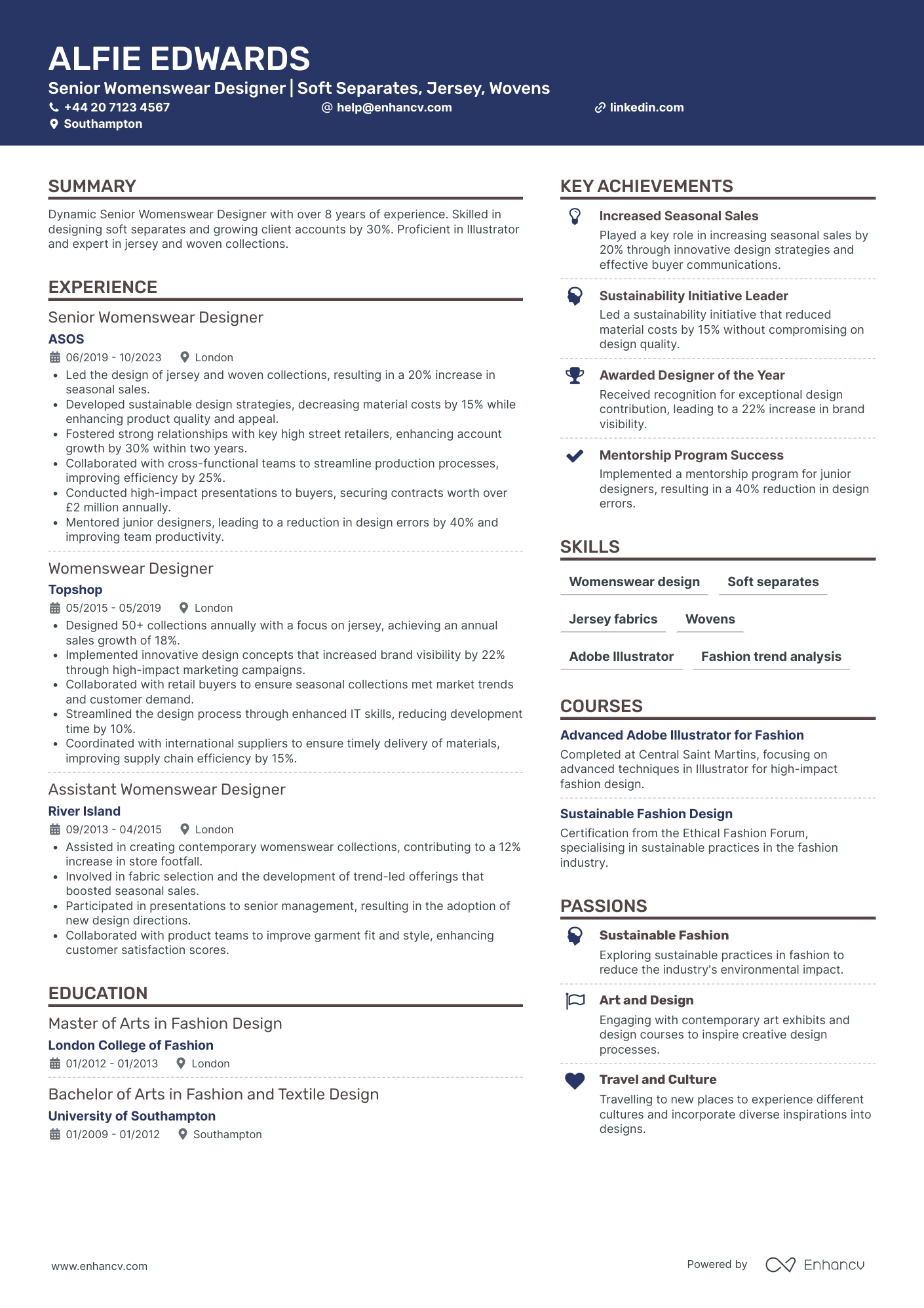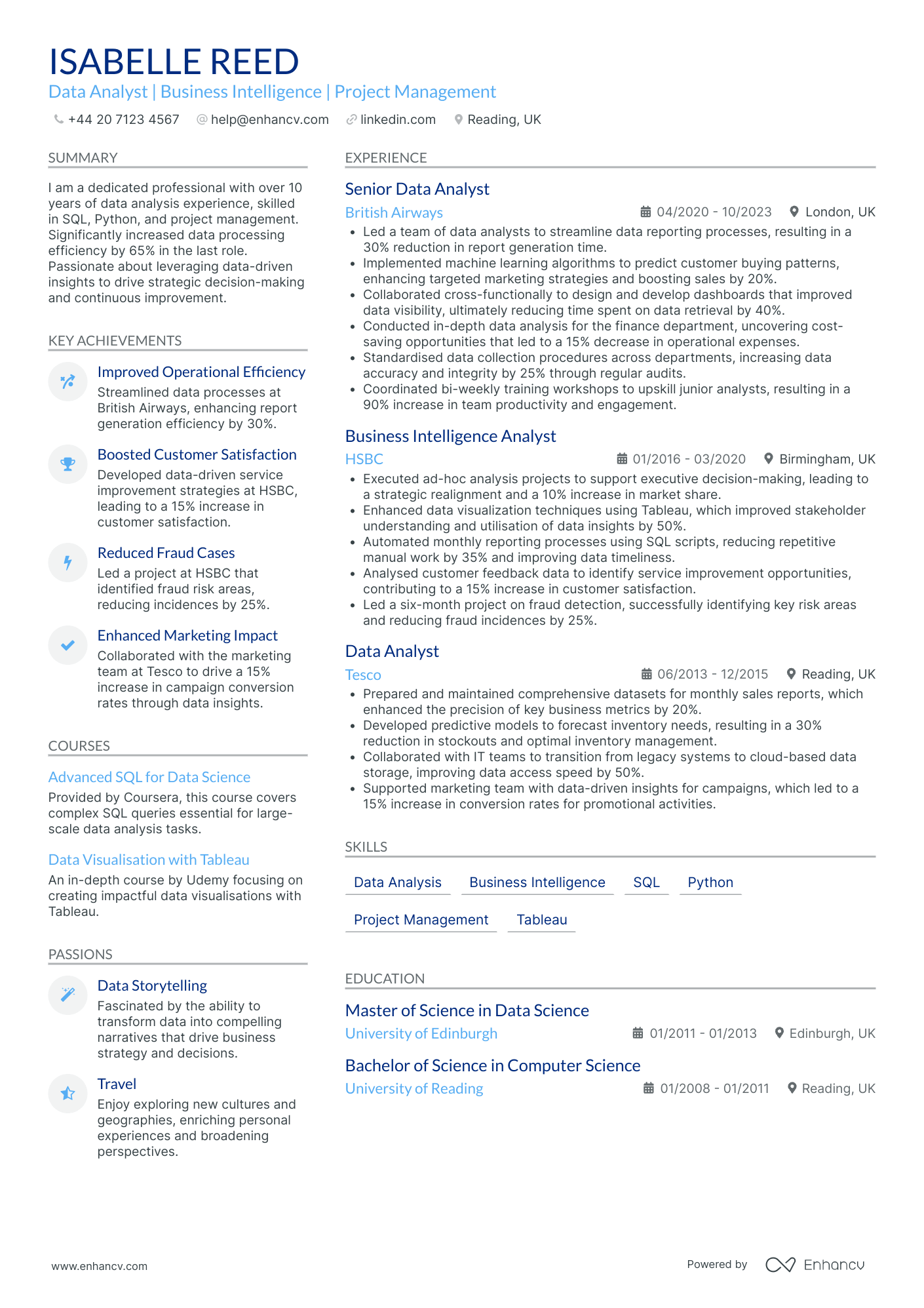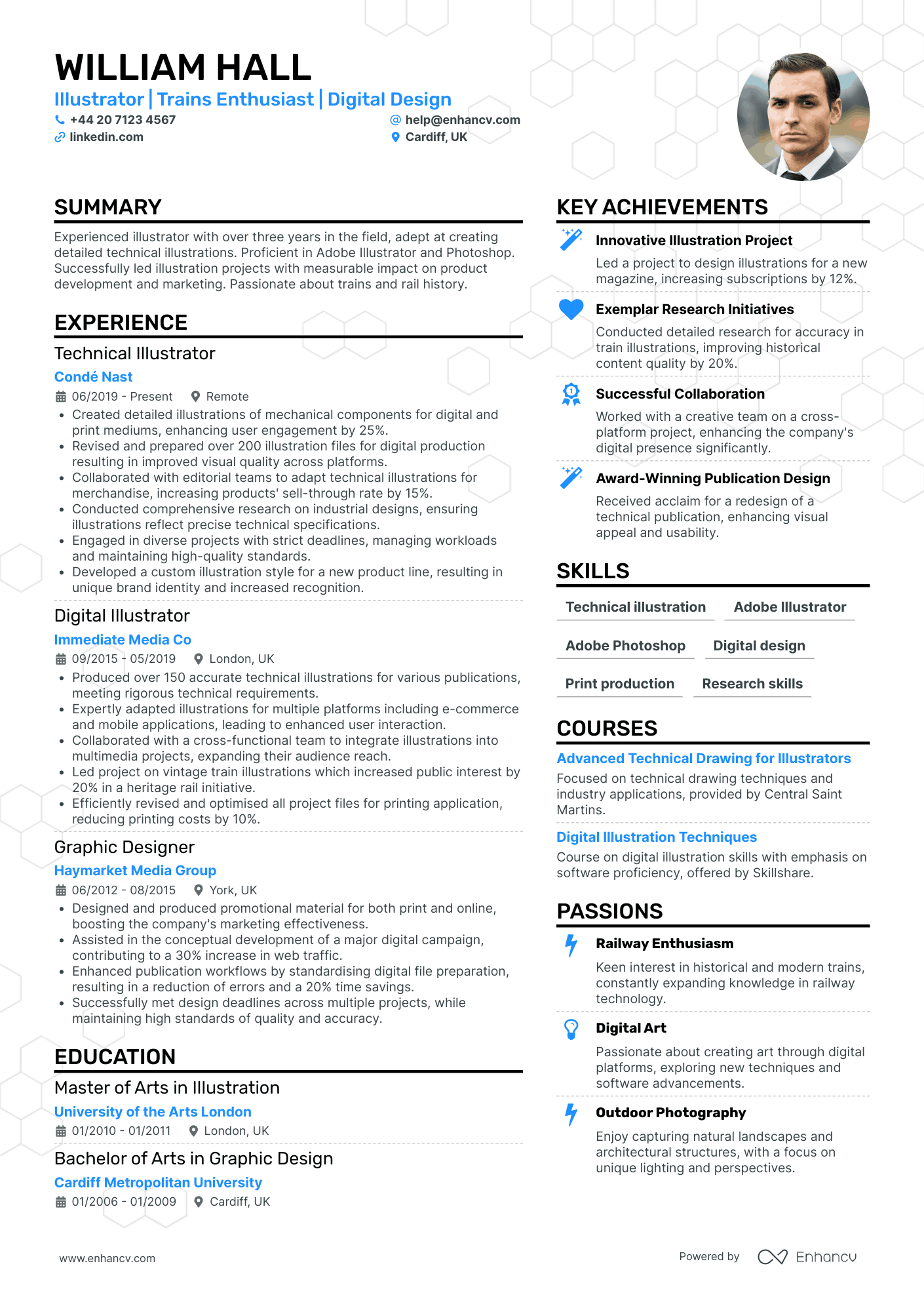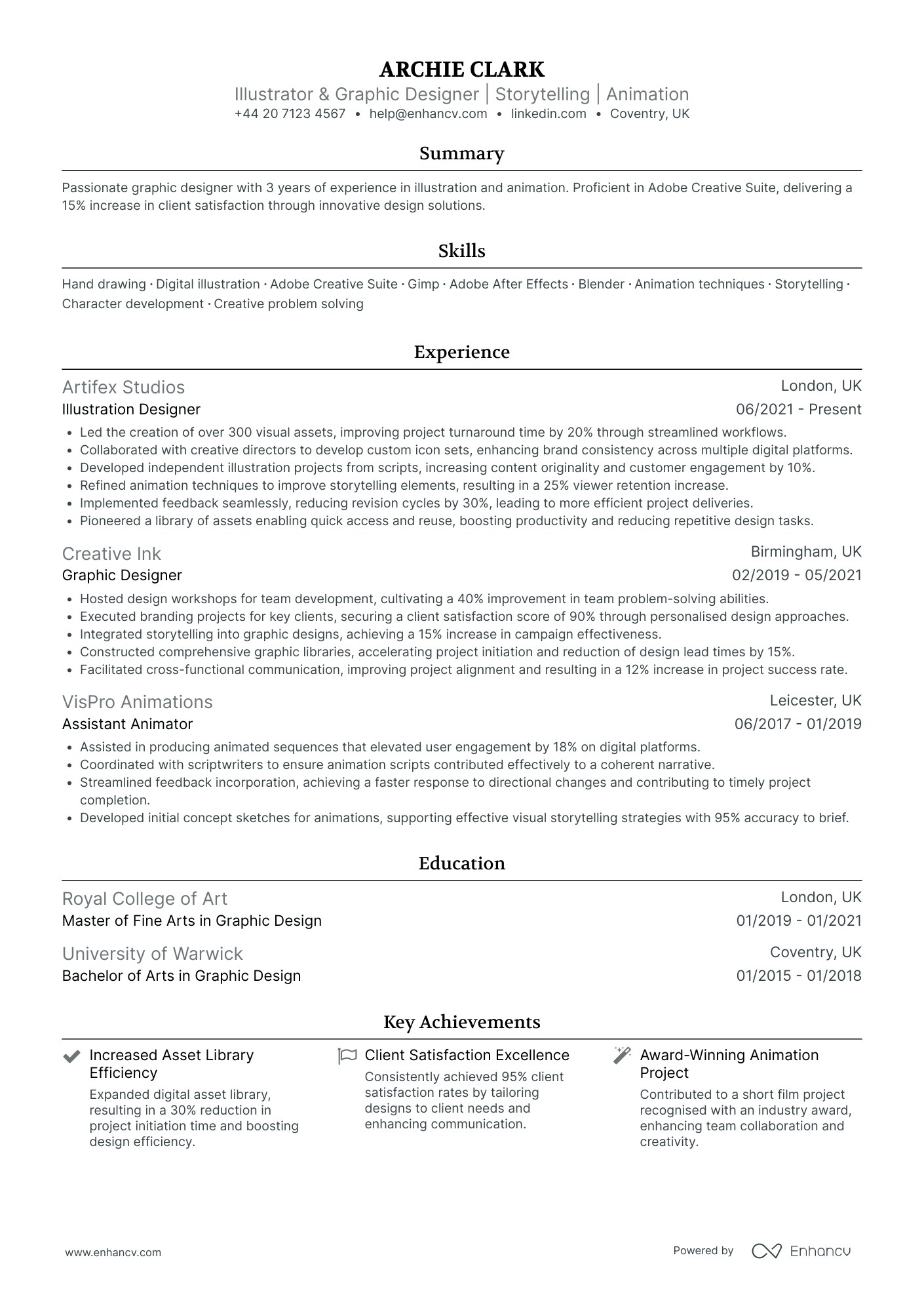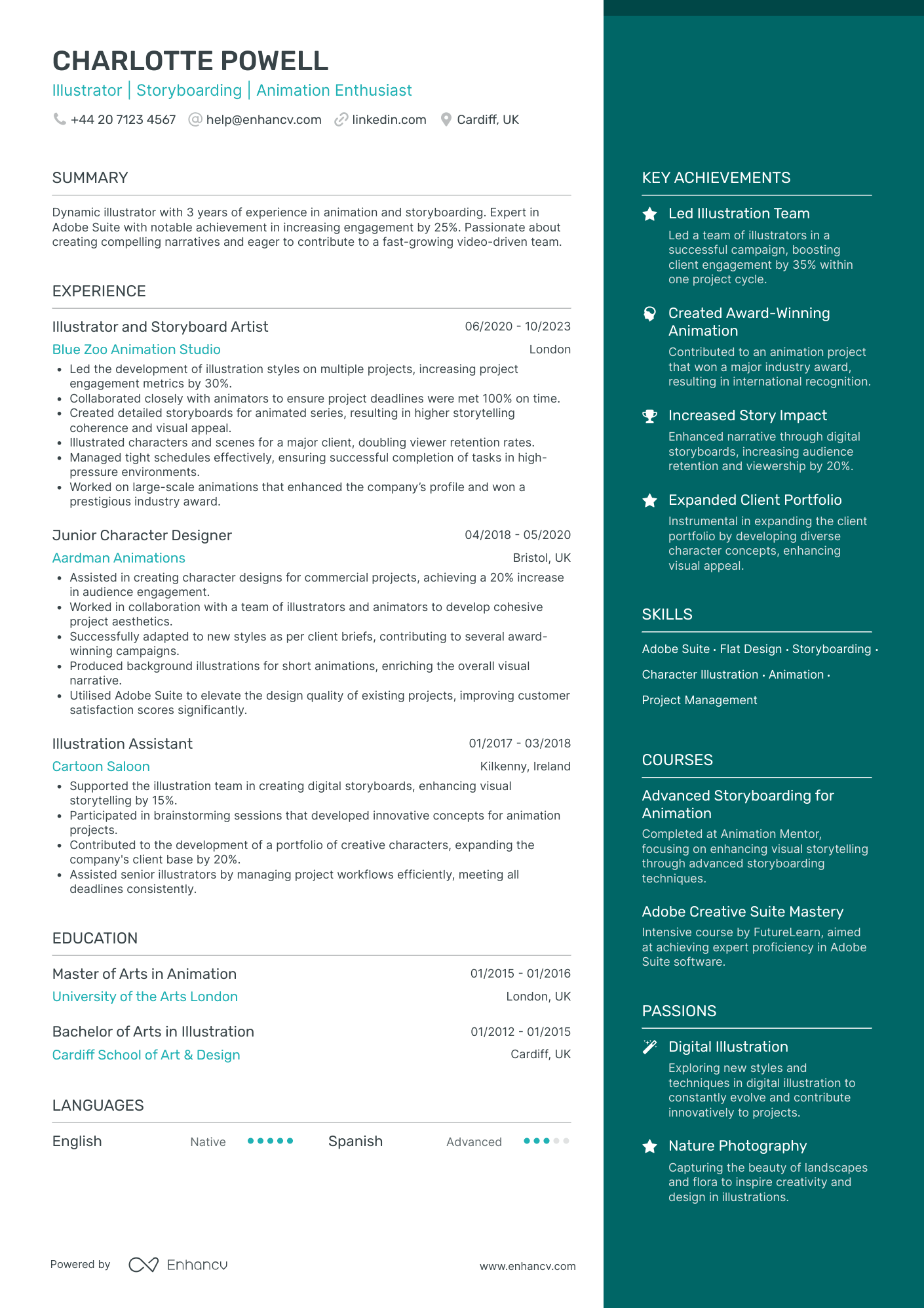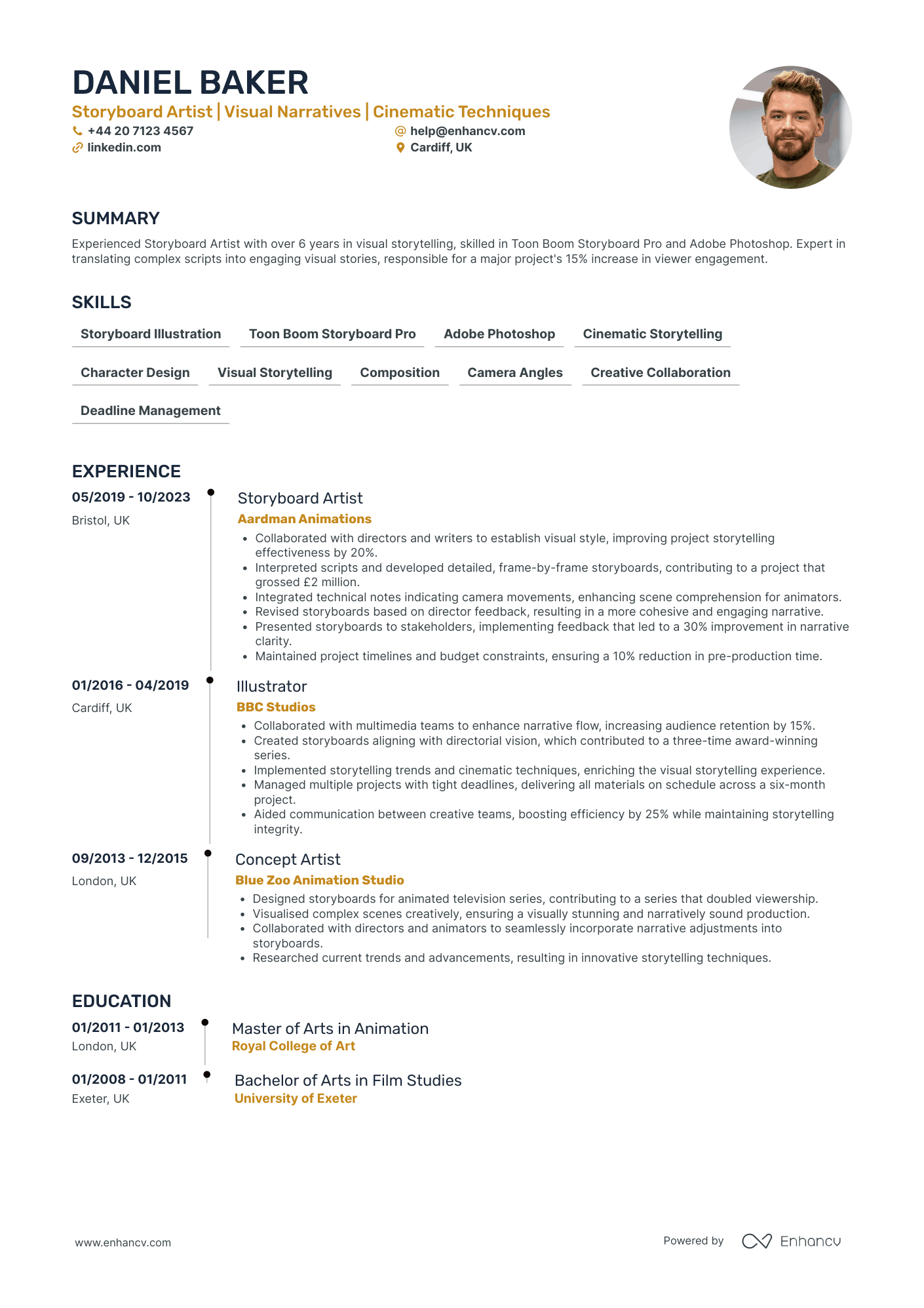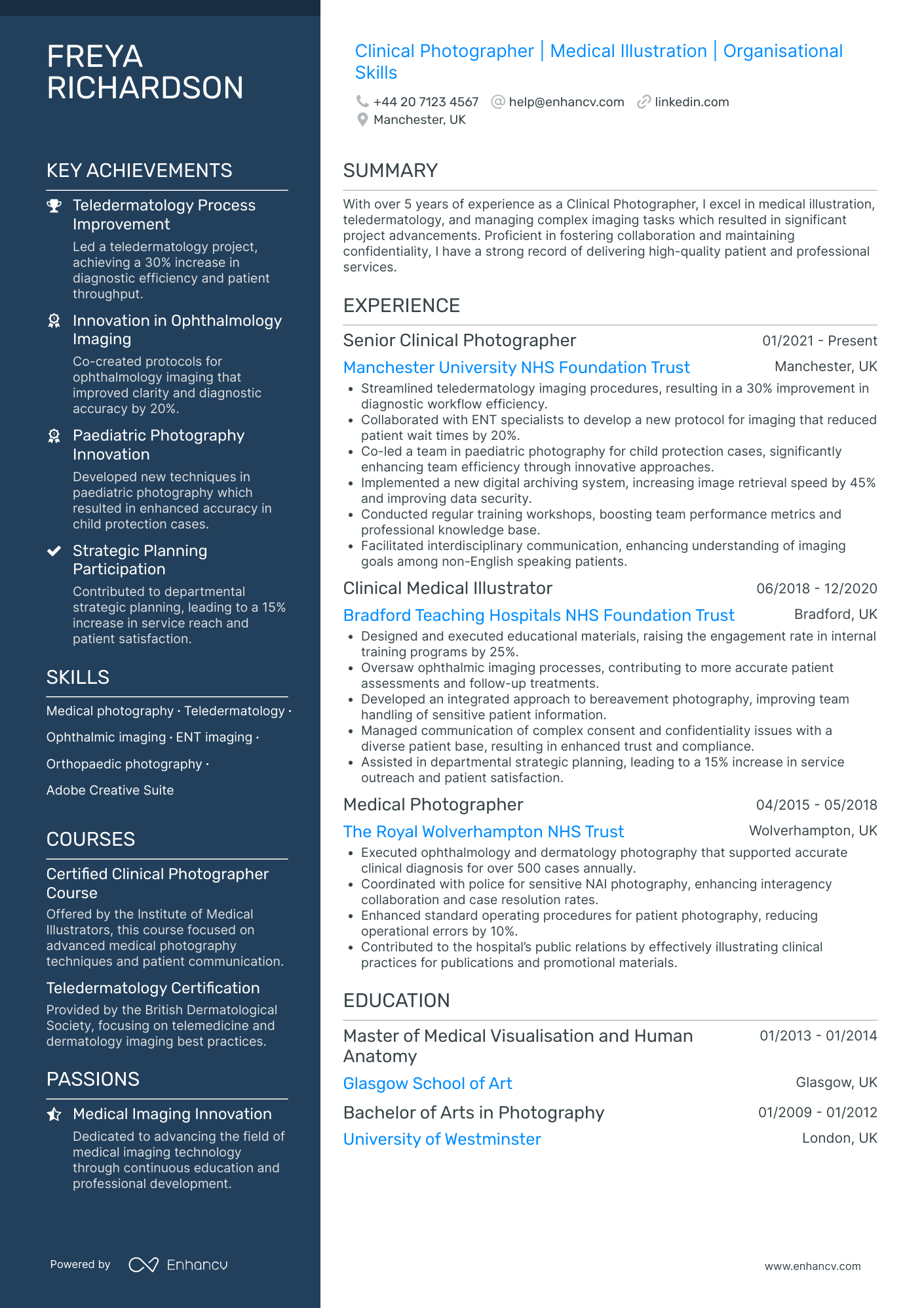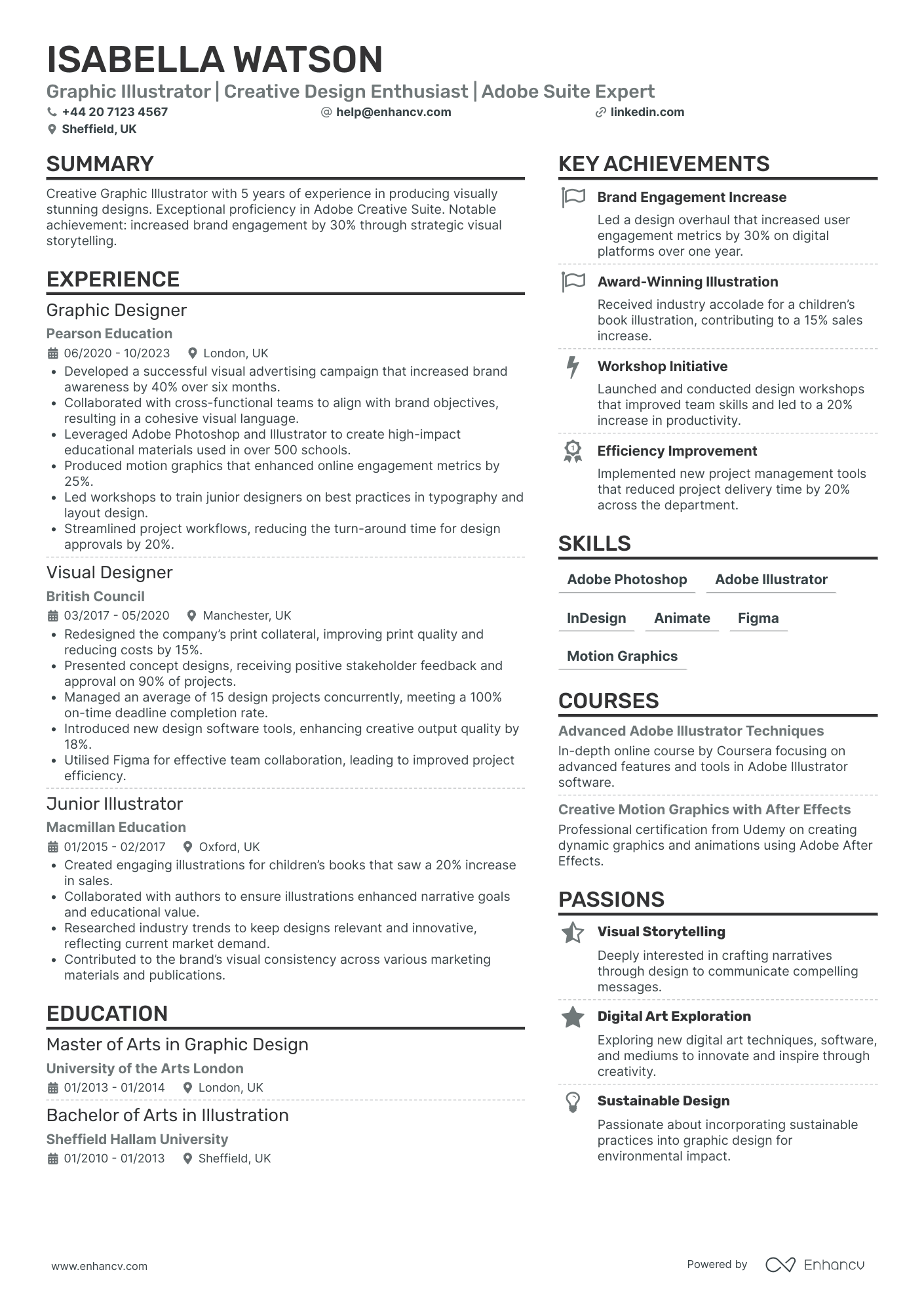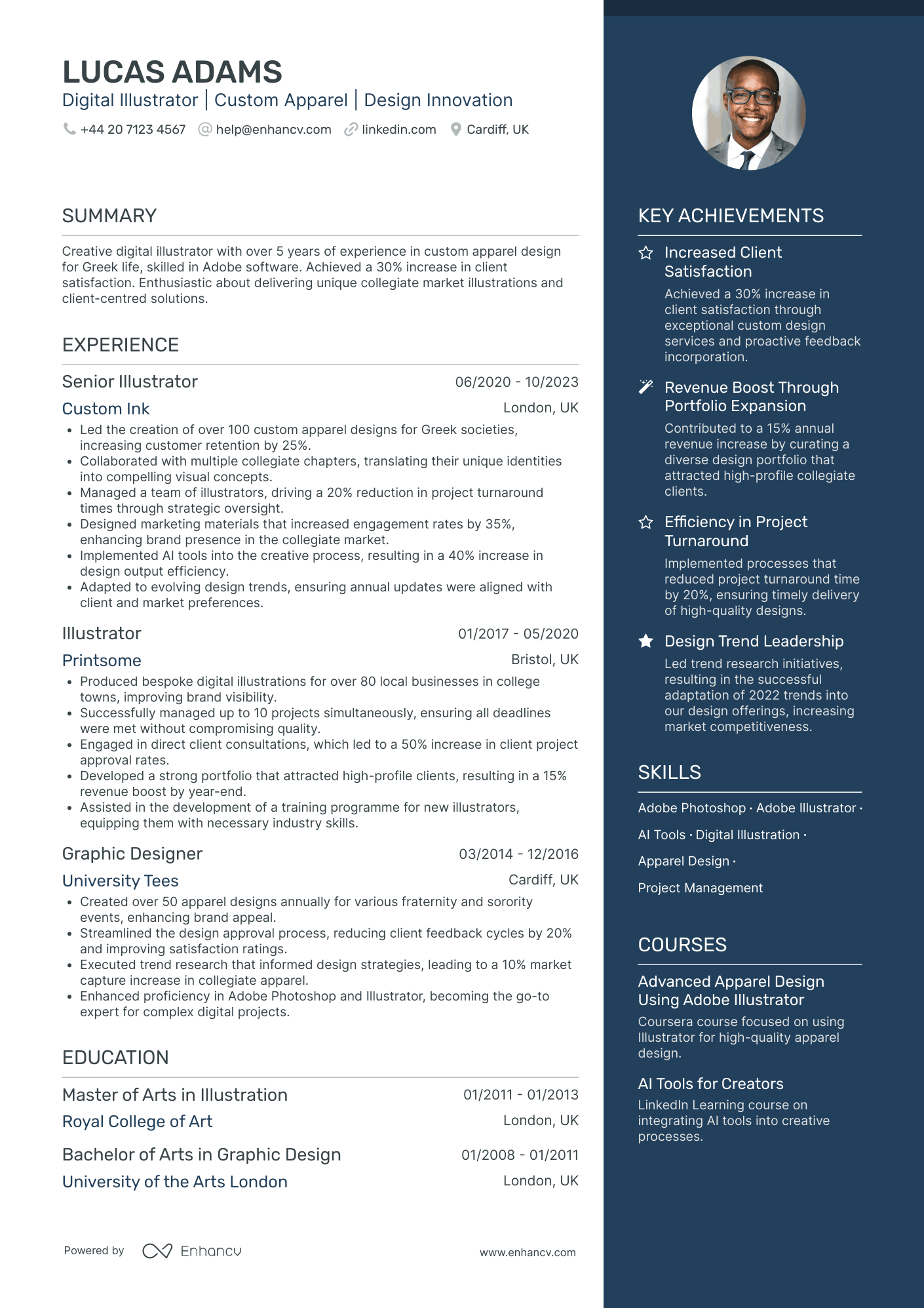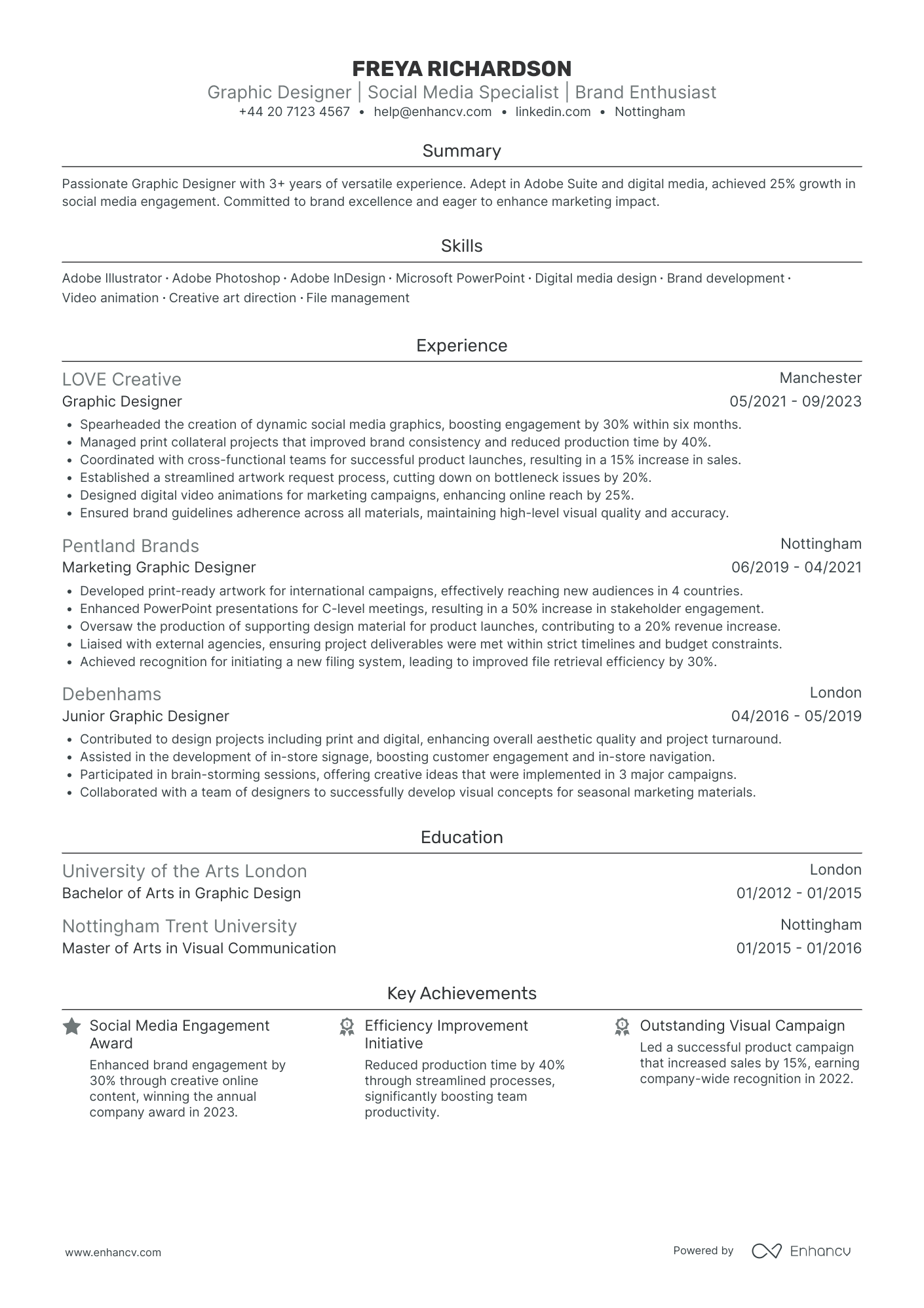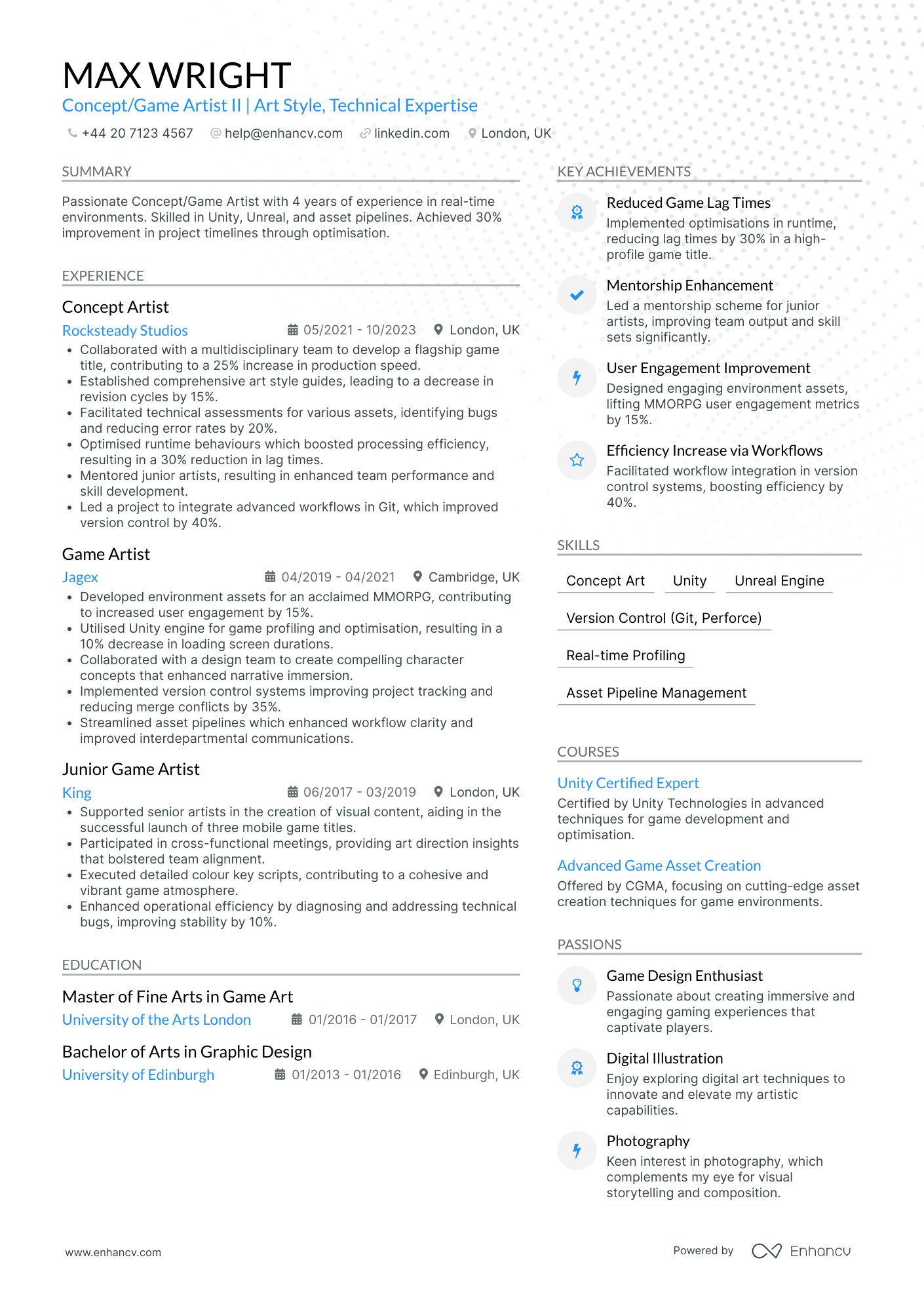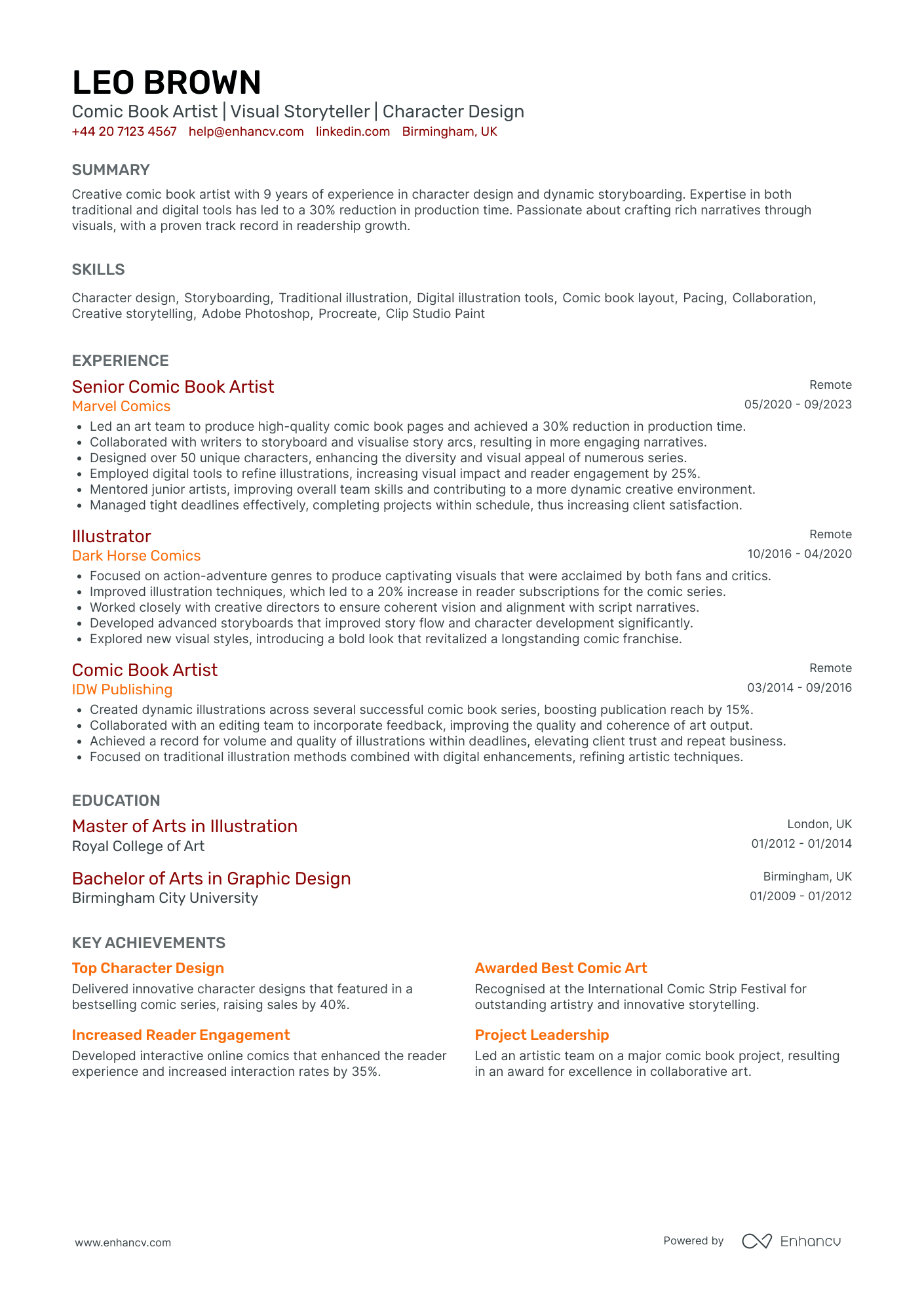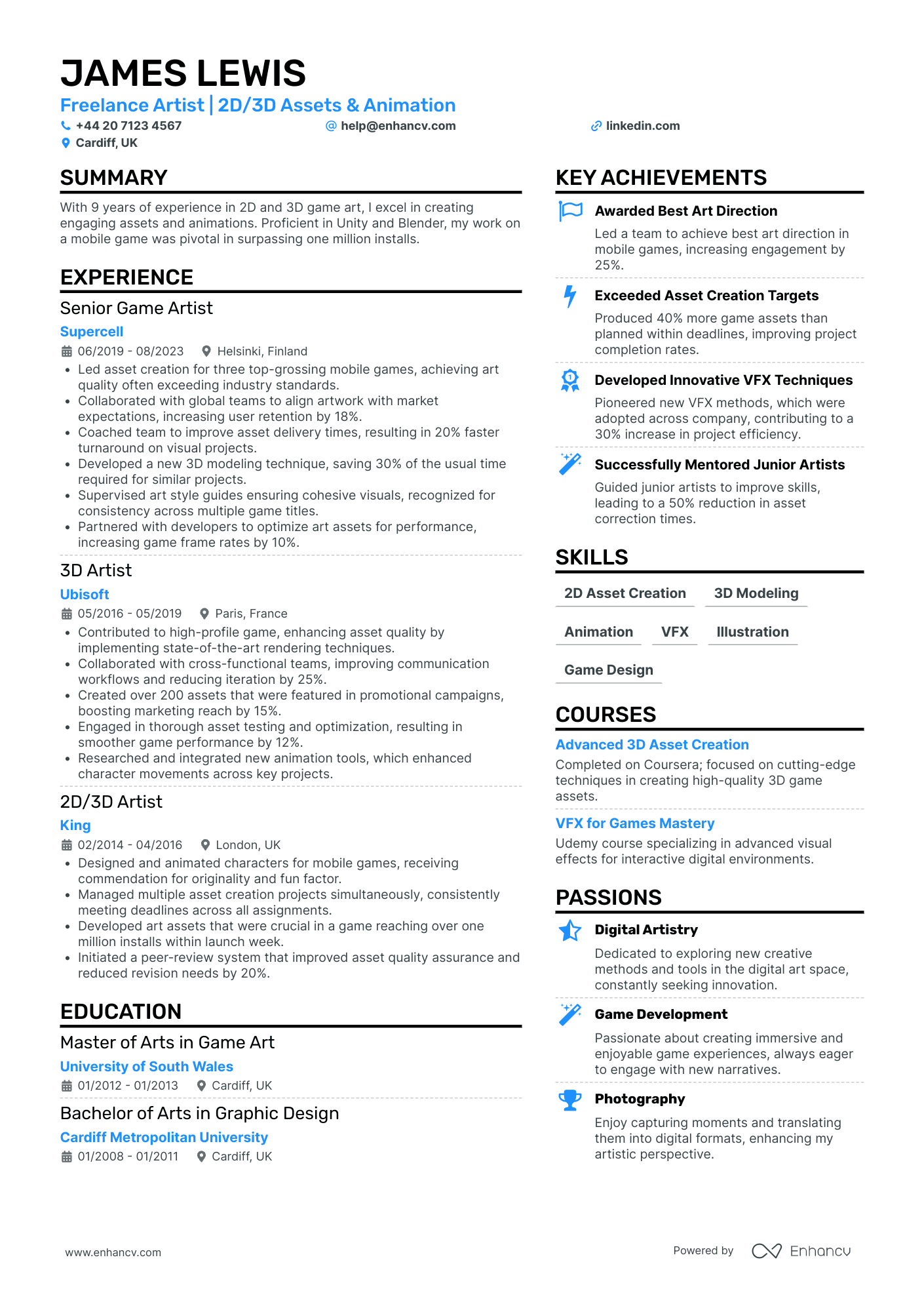Crafting a CV that accurately reflects your diverse skill set and creative projects can be a daunting challenge for an illustrator. By delving into our guide, you'll discover effective strategies to showcase your unique talents and construct a CV that stands out to potential clients and employers.
- Answer job requirements with your illustrator CV and experience;
- Curate your academic background and certificates, following industry-leading CV examples;
- Select from +10 niche skills to match the ideal candidate profile
- Write a more succinct experience section that consists of all the right details.
Do you need more specific insights into writing your illustrator CV? Our guides focus on unique insights for each individual role:
CV examples for illustrator
By Experience
Illustrator Assistant
- Clear and structured content presentation - The CV is presented in a neat and concise manner, making it easy for readers to quickly grasp Jacob's skills, experience, and achievements. Each section is clearly labeled, and bullet points are used effectively to highlight specific accomplishments, ensuring that important details are easy to find.
- Notable career growth and trajectory - Jacob's CV demonstrates a strong career progression within the logistics and administration sectors, moving from an Order Processing Assistant at Amazon UK to a leadership role as an Ecommerce Packing Supervisor at Hermes. This trajectory shows increased responsibility and expertise in managing and improving operational processes.
- Emphasis on achievements and their business impact - The CV provides specific examples of Jacob's contributions, such as the implementation of a stock management system that improved efficiency by 30% and his efforts in elevating customer satisfaction ratings by 18%. These accomplishments not only highlight his skills but also underscore his ability to generate significant business benefits.
Junior Illustrator
- Articulates clear career progression - Rosie Gray’s CV effectively maps out a steady and logical career trajectory from a Design Intern at the LEGO Group to a Junior Graphic Designer at Hasbro, showcasing her consistent growth within the multimedia design industry. This reflects her expanding responsibilities and influence in the field.
- Leverages specialized skills and tools - Rosie emphasizes her technical proficiency in industry-standard tools such as Adobe Creative Suite, including Photoshop, Illustrator, and After Effects. Her expertise in these digital tools is essential for a multimedia graphic designer, which she uses to drive brand design consistency and visual appeal successfully.
- Illustrates significant achievements with business impact - The CV clearly highlights Rosie’s achievements that have had a measurable impact on business outcomes, such as leading a team to redesign product packaging for Hasbro, which resulted in a 20% increase in sales. These accomplishments not only exemplify her capability but also her contribution to the companies she has been part of.
Senior Illustrator
- Structured Career Progression - Jacob Roberts’ CV clearly outlines a steady and strategic career trajectory. From starting as a Junior UX Designer to advancing to a Senior UX/UI Designer position, his roles have progressively built upon each other with increasing responsibility and specialization in the gaming industry.
- Industry-Specific Expertise - The CV highlights Jacob’s proficiency with tools and methodologies that are critical in the gaming and UX/UI design industry, such as Figma, Unity, and value proposition mapping. His technical depth is reflected in his ability to integrate user-centric design with business objectives, which is crucial for creating engaging game experiences.
- Achievements and Business Impact - Jacob's CV is impactful due to the quantifiable achievements that demonstrate his ability to enhance business outcomes. Increasing user engagement by 30% within six months and improving design efficiency by 40% are not just numbers but indicators of his effectiveness in contributing to business goals through user-centered design improvements.
Lead Illustrator
- Clear Structure with Concise Information - The CV is exceptionally well-structured, with clearly defined sections that provide concise information about Archie's professional journey. The use of bullet points in the experience section helps in quickly conveying essential details, making it easy for a reader to grasp the candidate's achievements and skills effectively.
- Rich Career Mobility in Animation Industry - Archie's career trajectory highlights a progressive movement through respected positions within the animation and design industry. Starting as a Junior Illustrator and advancing to a position at Blue Zoo Animation Studio showcases not only upward mobility but also specialization in a chosen field, reinforcing dedication and expertise.
- Integration of Technical Tools and Innovative Methods - The CV demonstrates Archie's proficiency with industry-standard tools like the Adobe Creative Suite, alongside specialization in animation techniques. This combination of technical depth with creative methodologies indicates a high level of expertise, essential for creating compelling visual storytelling.
Illustrator Intern
- Structured presentation of diverse experiences - The CV is organized to provide a concise yet detailed overview of Alice's career, covering various roles and industries. The sections logically progress from education, experience, and skills, through to volunteering and passions, maintaining clarity throughout by using bullet points that make it easy for recruiters to navigate through her qualifications and accomplishments.
- Evidence of growth and adaptability - Alice's career trajectory reflects a clear upward trend, demonstrating her ability to grow from a Graphic Design Coordinator to undertaking a more challenging Freelance Web Designer role. Her transitions across roles in different companies and her hands-on experience in both design and development fields illustrate her versatile skill set and adaptability to different professional environments.
- Comprehensive technical skill set with creative flair - This CV underlines Alice’s proficiency in specific tools like Adobe Illustrator and Photoshop, along with her capability in web development languages such as HTML and CSS. Her focus on creative solutions and digital art, combined with her technical skills, makes her a distinctive candidate within her field, showcasing her commitment to aligning artistic vision with coding capabilities for holistic web design.
Entry-Level Illustrator
- Clear and Structured Content Presentation - Archie's CV is well-organized, allowing easy navigation through each section. The clarity is maintained by using concise bullet points and headers for each career phase, which makes comprehending his extensive background quick and efficient.
- Impressive Career Trajectory and Industry Growth - The CV reflects a steady progression in Archie's career, from a Technical Illustrator to a Senior CAD Illustrator. This growth showcases his increasing responsibility levels and expertise within the same technical field, highlighting stability and deepening proficiency.
- Demonstration of Impact Through Achievements - Every section of Archie's CV includes potential business impacts, such as improving project timelines by 20% or enhancing customer experience by 25%. These impacts not only quantify his contributions but also emphasize his role in promoting organizational efficiency and customer satisfaction.
Mid-Level Illustrator
- Strategic Presentation and Clarity - The CV is well-organized, using clear headings and concise bullet points that effectively communicate key responsibilities and achievements. Each section flows logically, ensuring that the reader can easily follow William Hall's career progression and expertise in graphic design and multimedia.
- Notable Career Progression and Sector Experience - William's career trajectory showcases significant growth, evolving from a Junior Illustrator to a Graphic Designer at BAE Systems. His roles reflect a broad industry exposure, spanning key players in defense and technology, which underlines his ability to adapt and thrive in different environments.
- Integration of Technical Proficiency with Creativity - The CV highlights William’s proficiency with industry-standard tools like Adobe Creative Suite and his ability to combine technical skills with creative design. His work on enhancing multimedia presentations and optimizing digital content storage demonstrates a deep understanding of both technical and creative elements critical in visual communication.
Senior-Level Illustrator
- Cohesive content presentation - The CV is structured in a way that allows for seamless navigation, with each section logically placed to guide the reader through Alfie's professional journey. Key information such as experience, education, and skills is concisely presented, emphasizing clarity and easy readability.
- Progressive career growth - A clear trajectory is evident through Alfie’s career, starting as an Assistant Womenswear Designer and advancing to a Senior Womenswear Designer role at ASOS. This progression highlights his dedication to growing within the industry, accumulating both experience and unique insights into fashion design, while taking on increased responsibilities over time.
- Emphasis on sustainability and innovation - Throughout the CV, there is a notable focus on sustainability in design methodologies, an increasingly crucial element in the fashion industry. This includes initiatives like reducing material costs through sustainable practices and developing eco-friendly design strategies, showcasing Alfie's forward-thinking approach and alignment with contemporary industry trends.
Principal Illustrator
- Clear and Structured Content Presentation - Isabelle's CV is meticulously organized, presenting her career details in a clear and structured manner. Each section is succinctly written, ensuring key information is easily accessible. The use of bullet points in the experience section highlights significant responsibilities and achievements without overwhelming the reader.
- Progressive Career Trajectory - The CV illustrates a well-defined career trajectory, demonstrating Isabelle's growth from a Data Analyst at Tesco to a Senior Data Analyst at British Airways. This advancement highlights her ability to take on more complex roles and responsibilities, underscoring her capability to lead teams and drive significant business value in different industry settings.
- Strong Emphasis on Achievements and Impact - The CV effectively conveys Isabelle's impact on her previous organizations by detailing quantifiable achievements. For example, she led projects that improved operational efficiency and reduced fraud, showcasing her ability to deliver tangible results that boosted customer satisfaction and streamlined business processes.
By Role
Children's Book Illustrator
- Structured and Comprehensive Content Presentation - The CV is well-organized, with clear sections dedicated to each aspect of the candidate’s background. Essential information such as education, experience, skills, and achievements are neatly categorized, ensuring that potential employers can easily navigate and understand the applicant’s qualifications. Conciseness is maintained throughout, allowing readers to quickly grasp key insights.
- Consistent Career Growth and Specialization - William Hall’s career progression demonstrates a clear trajectory from a Graphic Designer to a Technical Illustrator, showcasing steady development and specialization in the field of illustration. His progression highlights increasing responsibilities and the expansion of skills, as he moved from designing promotional materials to creating detailed technical illustrations, ultimately establishing himself as an expert in his area.
- Industry-Specific Technical Skills and Methodologies - The CV highlights Hall’s proficiency with industry-standard tools like Adobe Illustrator and Adobe Photoshop, essential for any professional in digital illustration and design. His ability to create technical illustrations and adapt them for various platforms speaks to his in-depth technical knowledge and industry-specific methodologies, setting him apart as a candidate who possesses both the skills and the understanding required in his profession.
Technical Illustrator
- Clear and Structured Content Presentation - The CV is well-organized, with sections clearly delineated, allowing easy navigation through Archie's professional journey. Each section provides concise and comprehensive insights into the candidate's skills, experience, and accomplishments, making it easy for potential employers to assess his qualifications quickly.
- Diverse Career Trajectory - Archie's career progression from Assistant Animator to Illustration Designer demonstrates significant growth. This advancement lies in both complexity and responsibility, showcasing a robust rise within the graphic design industry while expanding into animation and storytelling, indicative of a strong adaptability to evolving creative demands.
- Industry-Specific Tools and Techniques - The CV highlights Archie's proficiency with essential industry tools such as Adobe Creative Suite and Blender, along with expertise in both digital illustration and animation techniques. This technical depth is complemented by his focus on storytelling and character development, crucial elements that enhance design narratives within the animation industry.
Fashion Illustrator
- Clarity and Cohesive Structure - The CV is presented with a clear and structured format, ensuring that each section is easily identifiable and smoothly transitions from one aspect of the candidate's career to the next. The inclusion of clear headings like "Experience", "Education", "Skills", and others allows for quick navigation, while concise bullet points in each section highlight key responsibilities and achievements effectively.
- Progressive Career Growth - Charlotte Powell's career trajectory showcases a clear path of progression within the animation and illustration industry. Starting as an Illustration Assistant and advancing to roles such as Junior Character Designer, and ultimately to an Illustrator and Storyboard Artist, the CV reflects consistent career growth and a deepening of responsibilities, showcasing an upward trajectory in skills and accomplishments.
- Industry-Specific Expertise and Tools - This CV emphasizes Charlotte's proficiency with industry-standard tools such as Adobe Suite, underscoring her technical depth in areas critical to animation and illustration. Additionally, the integration of courses like "Advanced Storyboarding for Animation" and "Adobe Creative Suite Mastery" further highlights her commitment to staying at the forefront of industry methodologies and software.
Storyboard Illustrator
- Rich and Varied Career Trajectory - Daniel Baker's CV effectively demonstrates career progression through his shifts across prestigious companies and roles, marking a clear growth from a Concept Artist to a Storyboard Artist. Each position signifies an advanced level of responsibility and an increased impact on project outcomes, showcasing an upward trajectory in the animation industry.
- Emphasis on Industry-Specific Tools and Methodologies - Highlighted proficiency in specialized tools such as Toon Boom Storyboard Pro and Adobe Photoshop, alongside advanced storytelling techniques, paints a picture of Daniel's technical expertise. His continuous learning through courses like Advanced Storyboarding Techniques suggests an ongoing commitment to mastering industry-specific skills, essential for creating compelling visual narratives.
- Quantified Achievements with Business Impact - Rather than merely citing numerical achievements, Daniel's CV ties results to business outcomes such as a 15% increase in viewer engagement and significant reductions in project pre-production time. This contextualizes his contributions within the business framework, illustrating how his creative skills drive tangible business successes and viewer satisfaction.
Medical Illustrator
- Effective content structuring - The CV is meticulously organized, making it easy to navigate through the candidate’s career history. Each section is clearly labeled, ensuring that the reader can quickly locate specific information. The use of concise bullet points helps in delivering information in a digestible format, enhancing readability and retention. This clear presentation aids in swiftly communicating the candidate’s qualifications and experience.
- Dynamic career trajectory - The candidate's career path showcases notable growth, with a series of steady promotions reflecting an upward trajectory in the digital marketing industry. Starting as a Marketing Coordinator and advancing to the role of Senior Digital Marketing Manager, the CV highlights a consistent climb through various managerial positions. This progression not only demonstrates professional development but also indicates a deepening expertise and increased responsibility in the digital marketing domain.
- Technical expertise in cutting-edge tools - What sets the candidate apart is their proficiency in industry-specific tools and methodologies. The CV mentions advanced skills in utilizing platforms such as SEMrush, Moz, and Ahrefs, which are critical for SEO and digital marketing analytics. This technical depth is complemented by familiarity with machine learning models applied in predictive marketing strategies, showing an ability to harness innovative technologies for strategic insights.
Graphic Illustrator
- Effective Content Presentation and Structure - Isabella's CV is well-structured and easy to navigate, with clear section headings and concise bullet points that succinctly convey her roles and accomplishments. This clarity allows potential employers to quickly grasp her qualifications and experience, making the CV both efficient and compelling.
- Progressive Career Trajectory - The CV effectively illustrates Isabella's professional growth from a Junior Illustrator to a Graphic Designer at a reputable company like Pearson Education. This progression underscores her ability to advance within the industry, consistently taking on increased responsibilities and more complex projects.
- Robust Use of Industry-Specific Tools - A notable aspect of Isabella's CV is her extensive use of industry-standard tools like the Adobe Creative Suite, Figma, and Animate, which showcases her technical expertise. Her ability to implement these tools effectively underlines her capability to produce high-quality design work in various settings.
Digital Illustrator
- Comprehensive Career Progression - Lucas Adams' CV presents a clear and consistent career trajectory, showcasing growth from a Graphic Designer to a Senior Illustrator. This progression highlights an increasing level of responsibility and expertise in the field, with each role building upon previous experiences in the custom apparel industry. His journey reflects an upward movement in both skills and leadership, providing a narrative of professional development that correlates with industry demands.
- Industry-Specific Skillset with Technical Depth - The CV highlights Lucas' proficiency in industry-specific tools such as Adobe Photoshop and Illustrator, alongside integrating AI tools into the creative process. This combination of traditional and modern methodologies positions him well within the evolving landscape of digital illustration and design innovation, demonstrating technical depth crucial for roles focused on design innovation and apparel customization.
- Impactful Achievements with Tangible Business Outcomes - The document includes significant achievements, such as increasing client satisfaction by 30% and reducing project turnaround times by 20%. These achievements are not only numeric but also paint a picture of how Lucas has tangibly contributed to business objectives such as enhancing client retention and streamlining processes, which are vital for long-term success in the competitive market of design and illustration.
3D Illustrator
- Dynamic Career Progression - Freya Richardson's CV illustrates a clear and upward career trajectory, from a Junior Graphic Designer role at Debenhams to more advanced positions at LOVE Creative and Pentland Brands. This advancement showcases her capacity to climb within the industry while taking on greater responsibilities and increasingly impactful roles, proving her ability to grow professionally and deliver significant business results.
- Unique Blend of Skills and Specializations - Freya pairs expertise in graphic design with a strong proficiency in social media, as reflected in her role titles and skillset. This combination gives her a competitive edge in creating cohesive brand strategies across multiple platforms, a crucial asset for modern marketing environments. The inclusion of video animation skills and courses like the Social Media Marketing Specialisation further highlights her multifaceted capabilities in this space.
- Demonstrated Impact with Achievements - The CV effectively showcases Freya's business impact by listing achievements with measurable outcomes, such as a 25% growth in social media engagement and a 40% reduction in production time. These accomplishments emphasize her strategic influence in driving performance enhancements and brand success within her past roles, making her an appealing candidate for similar future responsibilities.
Concept Illustrator
- Clear and Concise Presentation - The CV is well-structured, providing a clear overview of Max Wright's career with concise bullet points that quickly communicate key achievements and responsibilities. Each section is organized logically, making it easy to follow his career trajectory and understand his qualifications.
- Impressive Career Progression - Max Wright's career shows a strong upward trajectory, progressing from a Junior Game Artist to a Concept Artist II at prominent companies like King, Jagex, and Rocksteady Studios. This progression highlights not only his growth in roles but also in responsibilities and impact within the gaming industry.
- Advanced Technical Expertise - The CV details Max's proficiency with industry-standard tools such as Unity and Unreal Engine, as well as his ability to optimize asset pipelines and facilitate advanced workflows in Git. His technical skills are complemented by certifications that back his expertise in game development and optimization, making him a valuable asset to any game development team.
Comic Book Illustrator
- Strategic Career Progression - Leo Brown's CV illustrates a clear trajectory of career growth, transitioning from a Comic Book Artist at IDW Publishing to a Senior Comic Book Artist at Marvel Comics. This progression highlights a consistent enhancement in leadership roles and responsibilities, showcasing his ability to take on greater challenges in the industry.
- Impactful Achievements - The CV effectively emphasizes Leo's accomplishments, such as boosting reader engagement by 25% and reducing production time by 30%. These details not only quantify his impact but also underscore his strategic approach to improving efficiency and enhancing the reader's experience, making his contributions significant to his employers.
- Diverse Skill Set and Tools - Leo possesses a robust mastery of both traditional and digital illustration tools, including Adobe Photoshop and Clip Studio Paint. His technical expertise, coupled with skills in character design, storyboarding, and pacing, underline his comprehensive understanding of the artistic processes inherent in the comic book industry.
Freelance Illustrator
- Structured Career Progression - The CV outlines a progressive career path with increasing responsibilities and roles at reputable companies such as Supercell and Ubisoft, demonstrating growth and confidence in the industry. James ascended from 2D/3D Artist to Senior Game Artist, underscoring a consistent elevation in skills and leadership capabilities over the years.
- Innovative Use of Tools and Techniques - The CV highlights James's proficiency with a wide array of industry-standard tools like Adobe Creative Suite, Maya, and Blender. It also notes the development of unique 3D modeling and VFX techniques, which emphasizes his technical depth and innovation, contributing significantly to company-wide efficiencies.
- Cross-functional Collaboration and Impact - James's experience with collaborating across global and cross-functional teams showcases his versatility and ability to adapt, ensuring seamless workflow and alignment of art assets with business goals. This collaboration is critical in achieving high user retention and improving project outcomes, as demonstrated by a 20% faster visual project turnaround.
Structuring your illustrator CV layout: four factors to keep in mind
There are plenty of best practices out there for your CV layout and design. At the end of the day, a clear format and concise CV message should be your top priority. Use your CV design to enhance separate sections, bringing them to the forefront of recruiters' attention. At the same time, you can write content that:
- Follows the reverse chronological order in the experience section by first listing your most recent jobs;
- Incorporates your contact information in the header, but do skip out on the CV photo for roles in the UK;
- Is spotlighted in the most important sections of your CV, e.g. the summary or objective, experience, education, etc. to show just how you meet the job requirements;
- Is no longer than two-pages. Often, the one-page format can be optimal for your illustrator CV.
Before submitting your CV, you may wonder whether to export it in Doc or PDF. With the PDF format, your information and layout stay intact. This is quite useful when your CV is assessed by the Applicant Tracker System (or the ATS) . The ATS is a software that scans your profile for all relevant information and can easily understand latest study on the ATS , which looks at your CV columns, design, and so much more.

PRO TIP
For certain fields, consider including infographics or visual elements to represent skills or achievements, but ensure they are simple, professional, and enhance rather than clutter the information.

The top sections on a illustrator CV
- Summary of Key Illustrator Skills includes a concise showcase of your most relevant technical skills and artistic styles.
- Professional Experience as an Illustrator displays your work history and notable projects, emphasising creative roles.
- Portfolio of Illustrations highlights your best work, showing diversity and expertise in various mediums and techniques.
- Education and Training in Art/Illustration presents your formal qualifications and any specialised training in the field.
- Software Proficiency and Tools section outlines your competency with industry-standard drawing and editing software.

What recruiters value on your CV:
- Highlight your technical proficiency in illustration tools like Adobe Illustrator, Photoshop, and other relevant software to showcase your capability in creating diverse forms of illustrations.
- Include a portfolio section with links to your most compelling works or attach a separate document, providing potential employers with direct evidence of your talent and style.
- Focus on various projects you have worked on, detailing the type of illustrations provided, such as editorial, books, branding, or concept art, to demonstrate your versatility and experience.
- Mention any collaborative work experience, especially with writers, designers, and art directors, to show you can effectively contribute to creative teams and projects.
- Emphasise any unique styles or techniques you have mastered, any exhibitions you've participated in, or awards you've won to distinguish yourself from other candidates.
Recommended reads:
Making a good first impression with your illustrator CV header
Your typical CV header consists of Your typical CV header consists of contact details and a headline. Make sure to list your professional phone number, email address, and a link to your professional portfolio (or, alternatively, your LinkedIn profile). When writing your CV headline , ensure it's:
- tailored to the job you're applying for;
- highlights your unique value as a professional;
- concise, yet matches relevant job ad keywords.
You can, for examples, list your current job title or a particular skill as part of your headline. Now, if you decide on including your photo in your CV header, ensure it's a professional one, rather than one from your graduation or night out. You may happen to have plenty more questions on how to make best the use of your CV headline. We'll help you with some real-world examples, below.

Examples of good CV headlines for illustrator:
- Creative Illustrator | Children's Book Specialist | Adobe Certified Expert | 5+ Years' Experience
- Senior Concept Artist | Dynamic Storyboarding | Sci-Fi & Fantasy | MA Illustration | 10 Years in Industry
- Mid-Level Illustrator | Educational Media Focus | Proficient in Digital & Traditional Media | 3 Years' Practice
- Junior Graphic Illustrator | Marketing Collateral Expert | BFA Honours | Rapid Prototyping Skills | 2 Years' Experience
- Lead Character Designer | Video Game Artistry | 3D Modelling | 8 Years' Professional Creativity
- Freelance Technical Illustrator | Architectural & Engineering Drawings | AutoCAD Specialist | 4+ Years of Precision Work
Your illustrator CV introduction: selecting between a summary and an objective
illustrator candidates often wonder how to start writing their resumes. More specifically, how exactly can they use their opening statements to build a connection with recruiters, showcase their relevant skills, and spotlight job alignment. A tricky situation, we know. When crafting you illustrator CV select between:
- A summary - to show an overview of your career so far, including your most significant achievements.
- An objective - to show a conscise overview of your career dreams and aspirations.
Find out more examples and ultimately, decide which type of opening statement will fit your profile in the next section of our guide:

CV summaries for a illustrator job:
- With over a decade of experience as a professional illustrator, possessing a formidable portfolio showcasing a distinctive style in the creation of children's books and branding illustrations, this candidate has successfully executed over 300 projects, including an award-winning educational book series.
- As a seasoned graphic designer with 8 years of experience pivoting to illustration, this professional brings a unique blend of visual storytelling and digital design expertise to the table, having spearheaded major campaigns translating complex concepts into engaging illustrations.
- Transitioning from a successful 5-year career in architecture to the dynamic world of illustration, this candidate is equipped with a keen eye for detail and design, eager to leverage immense knowledge in spatial aesthetics and a passion for drawing to create memorable visual narratives.
- Dynamic Illustrator with 7 years of freelance and in-house experience, specialising in character design and digital art, recognised for the creation of a viral webcomic series. Proficient in Adobe Creative Suite and eager to craft compelling visual content that resonates with audiences.
- Eager to embark on an illustration career, this budding artist is determined to leverage a fresh perspective, untapped creativity, and recent Bachelor's degree in Visual Arts to explore new illustration frontiers and to develop a signature style that aligns with contemporary visual demands.
- Aiming to transition from a vibrant hobbyist background to a full-fledged professional illustrator, this newcomer is passionate about bringing characters to life and skilled in diverse mediums, including digital painting and traditional techniques, searching for opportunities to foster growth and artistic impact.
Narrating the details of your illustrator CV experience section
Perhaps you've heard it time and time again, but, how you present your experience is what matters the most. Your CV experience section - that details your work history alongside your accomplishments - is the space to spotlight your unqiue expertise and talents. So, avoid solely listing your responsibilities, but instead:
- adverts' keywords and integrate those in your experience section;
- Use your CV to detail how you've been promoted in the past by including experience in the reverse chronological order.
Before you start writing your illustrator CV experience section, dive into some industry-leading examples on how to structure your bullets.

Best practices for your CV's work experience section
- Demonstrated expertise in creating original illustrations for a variety of clients and projects, including children's books, advertising campaigns, and educational materials.
- Skilled in utilising digital tools and software such as Adobe Creative Suite (Photoshop, Illustrator, InDesign) to craft high-quality visual content that meets client specifications.
- Commissioned to design custom graphics and icons for web and mobile applications, effectively communicating brand identity and improving user experience.
- Collaborated with authors and editorial teams to develop storyboard concepts, ensuring that illustrations enhanced narrative and engaged readers.
- Maintained a strong understanding of current design trends and techniques, resulting in illustrations that resonated with contemporary audiences.
- Proven ability to work under tight deadlines, consistently delivering compelling artwork on time without compromising on quality or creativity.
- Flexibility shown in style and mediums, adept at creating both traditional hand-drawn illustrations and cutting-edge digital artwork to match project needs.
- Contributed to branding initiatives by developing unique and memorable logo designs that effectively represented company ethos and objectives.
- Active engagement in professional development opportunities, such as workshops and online courses, to refine skills and stay ahead in the dynamic field of illustration.
- Led a design team at CreativeWorks Ltd, enhancing visual content for major publishing clients resulting in a 25% increase in client satisfaction
- Spearheaded the transition to digital illustration using Adobe Creative Suite, which cut production times by 30% and improved efficiency
- Developed over 200+ unique book illustrations and cover designs, directly contributing to a 15% rise in sales for the company's top-selling authors
- Collaborated with independent game studios to create over 50 character designs, enhancing player engagement and contributing to a successful launch
- Produced environmental and asset art for 3 major mobile games, which have been downloaded over a million times
- Successfully managed project timelines and delivered high-quality artwork under tight deadlines for 10+ indie game projects
- Introduced digital illustration techniques at Art Innovators Inc, reducing traditional art material costs by 40%
- Completed a series of 30 educational children's books illustrations, significantly aiding the publisher's entry into the digital marketplace
- Mentored 5 junior illustrators, improving the overall quality of digital artwork produced by the department
- Played a key role in rebranding the visual identity of TechGadget Inc, yielding a 20% increase in brand recognition within the first year
- Designed and illustrated over 100+ advertising campaigns across print and digital media for consumer electronics
- Effectively coordinated with cross-functional teams to integrate illustrations into UI/UX designs of the company's website and mobile applications
- Oversaw the conceptualization and creation of original artwork for AnimationsRUs Ltd, becoming a mainstay feature in their award-winning animated films
- Implemented a new storyboard development process that improved team collaboration and reduced production times by 25%
- Crafted memorable character designs and backgrounds that defined the aesthetic of a top-rated animated series
- Designed interactive educational content for eLearningCo Ltd, enriching the learning experience for over 500,000 users
- Generated 3D models and animations for architectural visualizations, which attracted 2 major construction firms as long-term clients
- Facilitated the creation of instructional videos, which saw a 70% increase in user engagement across the platform
- Competently balanced content creation with illustration duties at Online Media Group, increasing content shares by 50% through compelling infographics
- Produced over 500 custom illustrations for web articles, enhancing the visual impact and driving a 40% increase in average time spent on the website
- Established a visual guideline that standardized content presentation across various platforms, greatly increasing brand consistency
- Assisted in storyboard creation and asset design for BluePix Studios, contributing to the smooth running of the animation pipeline
- Engaged in character design workshops, which improved the diversity of characters in studio productions and received positive audience feedback
- Provided timely delivery of illustrations for 4 consecutive children's television seasons, meeting all deadlines and exceeding quality expectations
Lacking professional expertise: how to write your CV to highlight your best talents
Don't count on your lucky stars when you're applying for a role, where you happen to have less (or almost none) professional experience. Recruiters sometimes do hire inexperienced candidates if they're able to present their unique value from the get-go. So, instead of opting for the traditional, CV experience section:
- List any applicable expertise you happen to have - no matter if it's a part-time job, internship, or volunteer work. This would hint to recruiters that your profile is relevant;
- Focus your CV on your transferrable skills or talents you've obtained thanks to your whole life and work experience. In effect, you'll be spotlighting your value as a candidate;
- Separate more space for your applicable academic background and certificates to show you have the technical know-how;
- Ensure that within your objective, you've defined why you'll like the job and how you'll be the perfect match for it. Always ensure you've tailored your CV to individual applications.
Looking for more good examples for your first job? We'll show you how other candidates, with less professional experience, have created their job-winning CVs.
Recommended reads:

PRO TIP
If applicable, briefly mention a situation where things didn’t go as planned and what you learned from it, demonstrating your ability to learn and adapt.
Describing your unique skill set using both hard skills and soft skills
Your illustrator CV provides you with the perfect opportunity to spotlight your talents, and at the same time - to pass any form of assessment. Focusing on your skill set across different CV sections is the way to go, as this would provide you with an opportunity to quantify your achievements and successes. There's one common, very simple mistake, which candidates tend to make at this stage. Short on time, they tend to hurry and mess up the spelling of some of the key technologies, skills, and keywords. Copy and paste the particular skill directly from the job requirement to your CV to pass the Applicant Tracker System (ATS) assessment. Now, your CV skills are divided into:
- Technical or hard skills, describing your comfort level with technologies (software and hardware). List your aptitude by curating your certifications, on the work success in the experience section, and technical projects. Use the dedicated skills section to provide recruiters with up to twelve technologies, that match the job requirements, and you're capable of using.
- People or soft skills provide you with an excellent background to communicate, work within a team, solve problems. Don't just copy-paste that you're a "leader" or excel at "analysis". Instead, provide tangible metrics that define your success inusing the particular skill within the strengths, achievements, summary/ objective sections.
Top skills for your illustrator CV:
Adobe Creative Suite proficiency
Digital painting and drawing
Traditional sketching and drawing
Character design
Knowledge of colour theory
Illustration software expertise
Typography and lettering
Conceptual thinking and visual storytelling
Print preparation and finishing
Graphic design principles
Creativity and innovation
Attention to detail
Time management and prioritisation
Communication and presentation
Problem-solving ability
Adaptability and flexibility
Collaboration and teamwork
Receptiveness to feedback
Patience and perseverance
Self-motivation and discipline

PRO TIP
If there's a noticeable gap in your skillset for the role you're applying for, mention any steps you're taking to acquire these skills, such as online courses or self-study.
Education and more professional qualifications to include in your illustrator CV
If you want to showcase to recruiters that you're further qualified for the role, ensure you've included your relevant university diplomas. Within your education section:
- Describe your degree with your university name(-s) and start-graduation dates;
- List any awards you've received, if you deem they would be impressive or are relevant to the industry;
- Include your projects and publications, if you need to further showcase how you've used your technical know-how;
- Avoid listing your A-level marks, as your potential employers care to learn more about your university background.
Apart from your higher education, ensure that you've curated your relevant certificates or courses by listing the:
- name of the certificate or course;
- name of the institution within which you received your training;
- the date(-s) when you obtained your accreditation.
In the next section, discover some of the most relevant certificates for your illustrator CV:

PRO TIP
Order your skills based on the relevance to the role you're applying for, ensuring the most pertinent skills catch the employer's attention first.
Recommended reads:
Key takeaways
What matters most in your illustrator CV-writing process is for you to create a personalised application. One that matches the role and also showcases your unique qualities and talents.
- Use the format to supplement the actual content, to stand out, and to ensure your CV experience is easy to comprehend and follows a logic;
- Invest time in building a succinct CV top one third. One that includes a header (with your contact details and headline), a summary or an objective statement (select the one that best fits your experience), and - potentially - a dedicated skills section or achievements (to fit both hard skills and soft skills requirements);
- Prioritise your most relevant (and senior) experience closer to the top of your CV. Always ensure you're following the "power verb, skill, and achievement" format for your bullets;
- Integrate both your technical and communication background across different sections of your CV to meet the job requirements;
- List your relevant education and certificates to fill in gaps in your CV history and prove to recrutiers you have relevant technical know-how.
